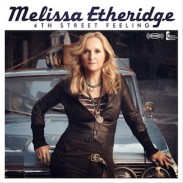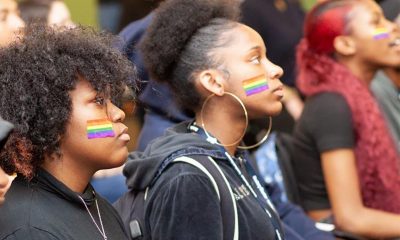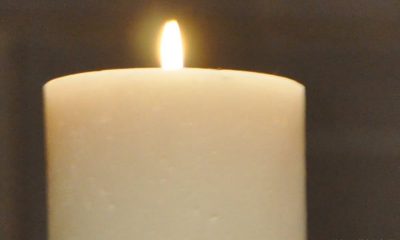Arts & Entertainment
Etheridge comes full circle
Out rock icon talks about her newest release taking us back to her roots; chats election year politics
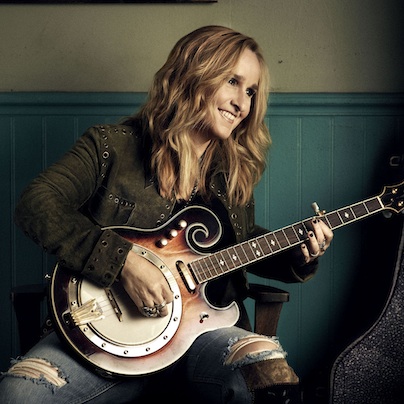
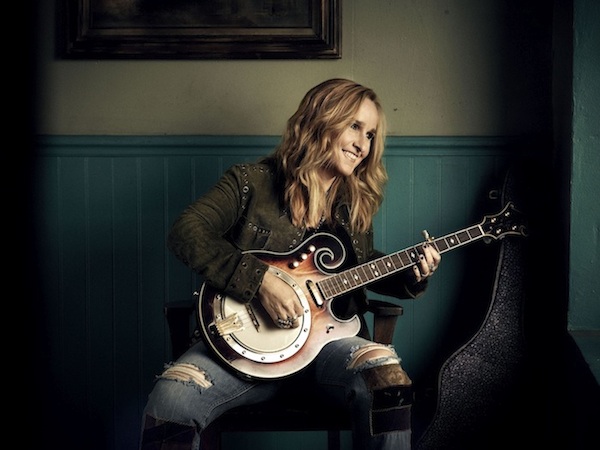
On the eve of her 25th year in the music industry, Melissa Etheridge is taking new risks, picking up new instruments and returning to her childhood roots. (Photo by James Minchin III courtesy Island Records)
Listening to Melissa Etheridge’s “4th Street Feeling,” out this week on her home label for 24 years, Island Records, one might agree with the dynamite rock legend’s own description of the sound as “organic.”
After adopting a more pop, adult contemporary sound in the middle of the last decade for singles like her cover of Greenwheel’s “Breathe,” the Oscar and two-time Grammy winning icon has returned to a nostalgic country blues sound that would flow well into a playlist with other artists she says she once played on her Chevy Impala’s 8-track in the ‘70s while driving the strip the album was named for in her hometown of Leavenworth, Kan.
Breaking barriers first by coming out in the early ‘90s and then rocking a Janis Joplin tribute live at the Grammys, bald from radiation and chemotherapy during breast cancer treatment, Etheridge returns to where she was born and raised for her eclectic 11th studio album, while experimenting with some new elements as well — like the banjitar featured in the first single “Falling Up.”
Etheridge, who will be honored at the National Museum for Women in the Arts starting today as part of the exhibition “Women Who Rock,” will bring her 4th Street Feeling tour to Bethesda’s Strathmore Music Center on Nov. 2.
““This next year, 2013, I’ll have been in the professional music business for 25 years,” Etheridge says of the National Museum for Women in the Arts exhibit when she sat down with the Blade to discuss her new album, the tour and the election year. “It’s nice to be honored. To be part of a wonderful community, the wonderful quilt of artists in our society that have brought forth the human experience.”
Etheridge has always been known as a confessional musician, but her personal woes have been on display in a new way with her high-profile 2010 split from actress Tammy Michaels and the contentious alimony and custody cases that have only recently been resolved. Nevertheless, the gravelly-voiced composer sings about her readiness to accept love again on her newest release, telling the Blade that when she sings, “I think I’m ready to try my hand at love again” in the track “Rock & Roll Me,” she’s singing about her budding relationship with “Nurse Jackie” creator Linda Wallem, whom she met through her ex.
““I don’t think we’re ever ready,” she says. “Like if it was up to me I’d still be sitting up in my room, ‘No! No! I’m not going to do that again!’ But love has a way of coming and the relationship that I’m actually in now, she’s been my best friend for 10 years. Believe me, I wasn’t going to go out and look for it, it found its way into my home. I’m very happy. Yes I am ready to try my hand at love again.”
Washington Blade: So the ‘banjitar’: where did you find this instrument?
Melissa Etheridge: It kind of started when I was writing songs to go play on the album, before I went to record. Listening to the radio, listening to popular music trends, I was delighted that people were playing organic instruments. I was hearing mandolins and banjos and real instruments.
I remember thinking, “I can play the banjo.” You know. I’m not terribly good at it, I played it a long, long time ago, but I can play a song on it.
So when I wrote “Falling Up,” I thought, “Yeah, I want to put banjo on this,” so I brought my banjo to the studio, and I said, “Yeah I’m going to play the banjo; not so good at it but you know, it’ll be fine.” And my guitar tech, Mark VanGool — he’s just a genius guitar guy — well why don’t you play the banjitar. I look at him like, ‘What are you talking about,’ and he says, “Yeah, its a banjo body, but its got a guitar neck, so you play it like a guitar, but it sounds like a banjo.” I said “That just sounds perfect!”
So he had one. He brought it. I played it, and the rest is history.
The album might be a dying art, with everyone being able to just buy singles so much. And really, I still think in a collection of music, not just one song. So all the songs are really different. It was hard to pick a first single. What’s representative of this album? It’s really hard. The record company chose “Falling Up,” and I was like “OK.”
Blade: You described that 4th Street feeling as the freedom to put everything you owned into your Chevy Impala. You’ve been on a long journey from Leavenworth Kan., so it’s interesting that the emotional center of this album has us listening to Al Green and Tina Turner on your old 8-track. Why was it so important for you to bring us all back here with you?
Etheridge: Because that’s where my journey took me. I thought in the spiritual evolution of aging and gaining wisdom that I would somehow shed all my old stuff and become something new. What I found is the only way you can become something new is to completely embrace all the old that you are and understand where you came from, and hold it, and even change your past in a way — in the way that you perceive it. In the way that you hold it now. And music takes you right back there. It’s obvious that we’re doing some reminiscing as a society right now. The music sounds like it’s right out of the ‘60s or something, everything is retro, it’s going back. It’s like taking the best of what we did do and growing on it. The organic stuff. That’s what I found. I’m not getting away from this, I’m being in this, and seeing it as something better.
Blade: You sing “Shake it like a polaroid” in your first single “Falling Up” which sounds like a nod to Outkast’s Andre 3000. Who are some other contemporary top 40 artists that you appreciate?
Etheridge: Oh yeah! Love Outkast. Always have. I think they’re very innovative and creative. I can cross all genres. My kids especially — like my daughter — play artists, she first turned me onto Ellie Goulding. She’s a little pop for me, but I appreciate a lot of the singer-songwriter stuff. Loved the Mumford and Sons album, Band of Horses, love Black Keys, (I’m) loving Alabama Shakes. All these great artists that I just want to see live and jump around with.
Blade: You came out 19 years ago and released “Yes I Am.” Just recently, R&B singer Frank Ocean followed your script, coming out and dropping an album; how has the music industry changed for gay musicians since ‘93?
Etheridge: Well, there’s safety in numbers, you know? I think in the ‘90s when those of us were peaking out, it was a sparse field. But I think everyone was kind of watching going, “Well, are you going to lose everything? Is it going to be like what we think?” And it’s all about how you kind of hold yourself in it.
Back then we did it. Did it hurt my career? I say, “I went from selling one million to six million.” People can see that I’m not blaming any of my perceived failures on being gay, so I hold it that way. Its just part of who I am. Its part of the big tapestry of who I am.
I don’t think there’s that big of a difference [between the current gay male artist experience and the experience for out lesbian artists]. I think we’re all aware of our society’s hang-ups when it comes to sexuality. We’ve realized that our sexual desires is what makes us different and dangerous. We’ve all grown up with it. We also know that the male aspect of that sexuality can be really frightening to a lot of people, so I think that it is somehow looked at as it’s harder to be a gay man and open in the entertainment industry. You’ve got to be really solid to do that. In general, it’s a little more delicate of a subject, just because of all the fear.
Blade: Four years ago, you took part in the historic Logo-HRC Presidential panel, and you were fairly vocal leading to the general. What do you think of what’s happened since then?
Etheridge: In the last 20 years, especially the last four, I think [the LGBT community has] become wiser about what part we play in this American drama that keeps unfolding in front of us, this experiment called Democracy and America and equality and what it really means. We challenge it to its very core and we’ve seen how we’ve been played in this game. OK, our votes are important, but no one can ever give us full cooperation, or they might be deemed less than, weak, or whatever scares them from giving us our civil rights. So I think this last thing that Obama did, by saying he supports gay marriage, it changes the direction of the stream just enough to kind of give us “Alright, there’s a reason we’ll vote for you again. Yes, you need our votes.” Because we’re a large group of people that cuts across every kind of people. And it also cuts across so many of our deep-seated fears in our whole culture. It’s a challenge. We’re challenged people, and we are challenging. And I think the homosexual community are the leaders in our great societal change right now. We are really pushing it, and I think it’s great.
Blade: What do you think of the Romney-Ryan ticket?
Etheridge: I think it’ll be a really interesting Trivial Pursuit question in 20 years. “Who was that running mate? Who was the Mormon guy?” I think it is fascinating. If you’d have told me in the ‘80s, “Oh my God, in 2012 there’ll be a black president — half black and half white — and he’s going to run against a Mormon with a Catholic Vice Presidential candidate …” But that shows that we are so diverse, that we are really opening up to all. You know what, in this great America of ours, there’s mixed-race people, there are Mormons, there are Catholics, there are every type of person and we have to show the world how it can all get along.
Blade: What are your thoughts on Rep. Todd Akin and his “legitimate rape” statement?
Etheridge: Things are spread instantly. A sentence can leave your mouth, and in a half hour, your life could be totally changed. I love that instant accountability that we have now. And it also gives us an opportunity to examine ourselves and go “Whoa! These deep-seated beliefs or fears are still there!” There’s a lot of dark shadowy ignorance out there in the world, and its coming to the surface, and we’re going to see it in some of our quote-unquote leaders. I don’t think we should shut him down. “OK dude. Wow. Let’s talk about that. What makes it legitimate or not?” Bring these things to the forefront and then let people vote their conscience.
Blade: It always seems with the LGBT community it’s two steps forward, two steps back. We’ve had months of good news, but we’ve had setbacks in North Carolina, some high profile anti-gay attacks and murders and just last week here in D.C. a member of our LGBT community shot a security guard at the Family Research Council’s headquarters. As an artist how do you respond to these crises of community?
Etheridge: I look at the LGBT community as the balance. We are all searching for balance right now. Our whole society. The whole human race. The gay community — we are examples of balance, because we have both the male and female inside each of us. And that’s pretty special. And when we can learn to love that about us more, then we’ll see that there are emotional distresses in every type of person in every walk and choice of person, and that there’s a lot of sadness and a lot of fear and it makes you perfect and normal. And we have to realize that our diversity is our strength, not only in our community but in our country, in the world. It’s loud and clear we better jump on that wagon, that everyone is different, and you have to celebrate those differences, otherwise we’re just going to destroy ourselves. So I appeal to the LGBT community and say, “Hold yourself as someone very special. Believe in who you are, and hold your balance. And that will help balance the rest of the world.”
Sports
Bisexual former umpire sues Major League Baseball for sexual harassment
Brandon Cooper claims female colleague sexually harassed him
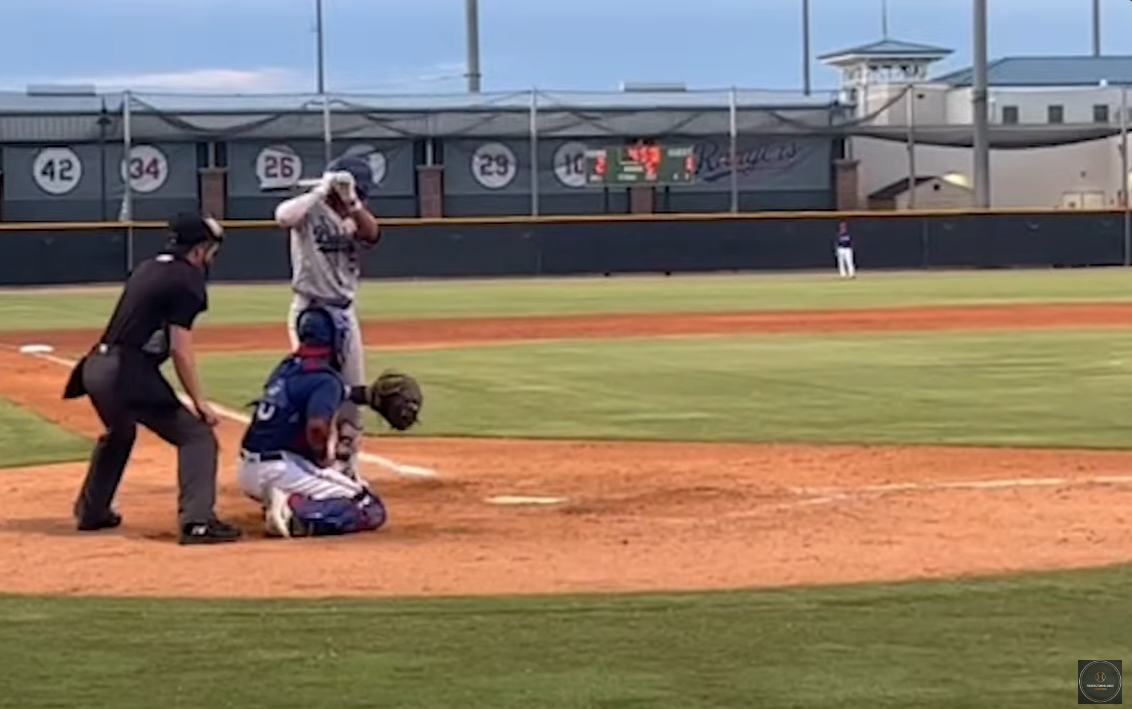
A fired former umpire is suing Major League Baseball, claiming he was sexually harassed by a female umpire and discriminated against because of his gender and his sexual orientation.
Brandon Cooper worked in the minor league Arizona Complex League last year, and according to the lawsuit he filed Wednesday in federal court in Manhattan, he identifies as bisexual.
“I wanted my umpiring and ability to speak for itself and not to be labeled as ‘Brandon Cooper the bisexual umpire,’” he told Outsports. “I didn’t want to be labeled as something. It has been a passion of mine to simply make it to the Major Leagues.”
But that didn’t happen. Instead of being promoted, he was fired. His suit names MLB and an affiliated entity, PDL Blue, Inc., and alleges he had endured a hostile work environment and wrongful termination and/or retaliation because of gender and sexual orientation under New York State and New York City law.
“Historically the MLB has had a homogenous roster of umpires working in both the minor and major leagues,” Cooper claims in his suit. “Specifically, to date there has never been a woman who has worked in a (regular) season game played in the majors, and most umpires are still Caucasian men. To try to fix its gender and racial diversity issue, defendants have implemented an illegal diversity quota requiring that women be promoted regardless of merit.”
Cooper claims former umpire Ed Rapuano, now an umpire evaluator, and Darren Spagnardi, an umpire development supervisor, told him in January 2023 that MLB had a hiring quota, requiring that at least two women be among 10 new hires.
According to the suit, Cooper was assigned to spring training last year and was notified by the senior manager of umpire administration, Dusty Dellinger, that even though he received a high rating in June from former big league umpire Jim Reynolds, now an umpire supervisor, that women and minority candidates had to be hired first.
Cooper claims that upon learning Cooper was bisexual, fellow umpire Gina Quartararo insulted him and fellow umpire Kevin Bruno by using homophobic slurs and crude remarks. At that time, Quartararo and Cooper worked on the same umpiring crew and being evaluated for possible promotion to the big leagues.
This season, Quartararo is working as an umpire in the Florida State League, one of nine women who are working as minor league umpires.
Cooper said he notified Dellinger, but instead of taking action against Quartararo, he said MLB ordered Cooper to undergo sensitivity training. According to his lawsuit, he was also accused of violating the minor league anti-discrimination and harassment policy.
Cooper’s suit says he met with MLB Senior Vice President of Diversity, Equity and Inclusion Billy Bean — who the Los Angeles Blade reported in December is battling cancer.
The lawsuit says at that meeting, Bean told the umpire that Quartararo claimed she was the victim, as the only female umpire in the ACL. Cooper said he told Bean Quartararo regularly used homophobic slurs and at one point physically shoved him. He also claims that he has video evidence, texts and emails to prove his claim.
But he said his complaints to Major League Baseball officials were ignored. His lawsuit said MLB passed him over for the playoffs and fired him in October. He said of the 26 umpires hired with Cooper, he was the only one let go.
Through a spokesperson, MLB declined to comment on pending litigation. Quartararo has also not publicly commented on the lawsuit.
a&e features
Eastern Shore chef named James Beard Finalist
Harley Peet creates inventive food in an inclusive space

In a small Eastern Shore town filled with boutiques, galleries, and the occasional cry of waterfowl from the Chesapeake, Chef Harley Peet is most at home. In his Viennese-inflected, Maryland-sourced fine-dining destination Bas Rouge, Peet draws from his Northern Michigan upbringing, Culinary Institute of America education, and identity as a gay man, for inspiration.
And recently, Peet was named a James Beard Finalist for Best Chef: Mid-Atlantic – the first “Best Chef: Mid-Atlantic” finalist representing the Eastern Shore.
Peet, after graduation from the Culinary Institute of America, took a position as sous chef at Tilghman Island Inn, not far from Bas Rouge. Falling in love with the Eastern Shore, he continued his passion for racing sailboats, boating, gardening, and fishing, and living his somewhat pastoral life as he opened Bas Rouge in 2016 as head chef, a restaurant part of the Bluepoint Hospitality group, which runs more than a dozen concepts in and around Easton, Md.
Coming from a rural area and being gay, Peet knew he had his work cut out for him. He was always aware that the service and hospitality industry “can be down and dirty and rough.”
Now as a leader in the kitchen, he aims to “set a good example, and treat people how I want to be treated. I also want to make sure if you’re at our establishment, I’m the first to stand up and say something.”
The Bas Rouge cuisine, he says, is Contemporary European. “I’m inspired by old-world techniques of countries like Austria, Germany, and France, but I love putting a new spin on classic dishes and finding innovative ways to incorporate the bounty of local Chesapeake ingredients.”
His proudest dish: the humble-yet-elevated Wiener Schnitzel. “It is authentic to what one would expect to find in Vienna, down to the Lingonberries.” From his in-house bakery, Peet dries and grinds the housemade Kaiser-Semmel bread to use as the breadcrumbs.
Peet works to support the LGBTQ community inside and outside of the kitchen. “I love that our Bluepoint Hospitality team has created welcoming spaces where our patrons feel comfortable dining at each of our establishments. Our staff have a genuine respect for one another and work together free of judgment.”
Representing Bluepoint, Peet has participated in events like Chefs for Equality with the Human Rights Campaign, advocating for LGBTQ rights.
At Bas Rouge, Peet brings together his passion for inclusion steeped in a sustainability ethic. He sees environmental stewardship as a way of life. Peet and his husband have lived and worked on their own organic farm for several years. Through research in Europe, he learned about international marine sourcing. Witnessing the impacts of overfishing, Peet considers his own role in promoting eco-friendly practices at Bas Rouge. To that end, he ensures responsible sourcing commitments through his purveyors, relationships that have helped create significant change in how people dine in Easton.
“I have built great relationships in the community and there’s nothing better than one of our long-standing purveyors stopping in with a cooler of fresh fish from the Chesapeake Bay. This goes especially for catching and plating the invasive blue catfish species, which helps control the species’ threat to the local ecosystem.
Through his kitchen exploits, Peet expressed a unique connection to another gay icon in a rural fine-dining restaurant: Patrick O’Connell, of three Michelin starred Inn at Little Washington. In fact, Peet’s husband helped design some of O’Connell’s kitchen spaces. They’ve both been able to navigate treacherous restaurant-industry waters, and have come out triumphant and celebrated. Of O’Connell, Peet says that he “sees [his restaurants] as canvas, all artistry, he sees this as every night is a show.” But at the same time, his “judgment-free space makes him a role model.”
Being in Easton itself is not without challenges. Sourcing is a challenge, having to either fly or ship in ingredients, whereas urban restaurants have the benefit of trucking, he says. The small town “is romantic and charming,” but logistics are difficult – one of the reasons that Peet ensures his team is diverse, building in different viewpoints, and also “making things a hell of a lot more fun.”
Reflecting on challenges and finding (and creating) space on the Eastern Shore, Peet confirmed how important it was to surround himself with people who set a good example, and “if you don’t like the way something is going … move on.”

Team DC, the umbrella organization for LGBTQ-friendly sports teams and leagues in the D.C. area, held its annual Night of Champions Awards Gala on Saturday, April 20 at the Hilton National Mall. The organization gave out scholarships to area LGBTQ student athletes as well as awards to the Different Drummers, Kelly Laczko of Duplex Diner, Stacy Smith of the Edmund Burke School, Bryan Frank of Triout, JC Adams of DCG Basketball and the DC Gay Flag Football League.
(Washington Blade photos by Michael Key)



















-

 State Department3 days ago
State Department3 days agoState Department releases annual human rights report
-

 Maryland5 days ago
Maryland5 days agoJoe Vogel campaign holds ‘Big Gay Canvass Kickoff’
-

 Politics4 days ago
Politics4 days agoSmithsonian staff concerned about future of LGBTQ programming amid GOP scrutiny
-

 District of Columbia23 hours ago
District of Columbia23 hours agoCatching up with the asexuals and aromantics of D.C.

